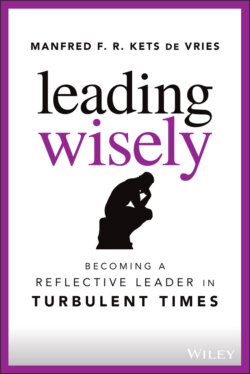Читать книгу Leading Wisely - Manfred F. R. Kets de Vries - Страница 16
The ‘stealth motivator’ that is death
ОглавлениеAs far as unknowns are concerned, death can be viewed as the final unknown. Death can be considered the ultimate mystery. However, given its mystifying nature, the knowledge of the inevitability of death may be an explanatory factor in your desire to acquire wisdom. Thus, at a certain point in your life, you may come to realize that the greatest mystery of your life is that it ends. That being so, it could well become the driving force for greater exploration.1 You may decide that whatever you are doing deserves greater scrutiny. As Socrates said very astutely, ‘The unexamined life is not worth living.’ When you are aware of endings, the fear of living an unlived life will become more pressing. If you have lived your life in such a manner, it will begin to feel like the last thing that you would like to happen. Therefore, could it be that the need to pursue wisdom is driven by the will to live life in such a way that you are prepared to face death when it comes? Could it be that your preoccupation with wisdom is based on the wish to unveil life's ultimate mystery?
The ever-presence of death may also lead you to question what you really want out of life. What would make your life truly meaningful? The reminder that you are mortal may even tempt you to ask the tough questions about your life such as, ‘Who am I?’ ‘Why am I here?’ ‘What drives me?’ ‘Is this the kind of life I want to live?’ ‘What would I like to accomplish in the life that I have left?’ If you are prepared to address these questions – if you do not want to live an unexamined life – you might find yourself walking on unexplored, but interesting paths. Also, in trying to deal with these questions, you may be forced to become more honest with yourself about the way that you are living. It may even motivate you to ask yourself, ‘What would you consider a life, well-lived?’ and ‘What changes, sacrifices and actions are you prepared to make to be able to live a fully lived life?’
It could very well be that once you realize the finality of life, you liberate yourself from letting life merely pass by. No longer will you live under the illusion that you have an infinite amount of time; that you can put off until some future date the need to understand what is bringing significance to your life. Instead, the inevitability of your impending death may teach you many things about the wise use of your time – about the various challenges that warrant your attention.
Most likely, given the statement, ‘Dust thou art, and to dust thou shalt return,’ many of us would like to fill our lives with meaningful activities. In fact, it is quite paradoxical that as soon as we become truly aware of the fact that life has an ending, we begin to appreciate what life has to offer.2 Once more, death anxiety encourages us to explore what our life is all about. Thus, knowing that there may come a day when our life will be flashing before our eyes, we want to make sure that whatever passes by is going to be worth watching.
Of course, some people may be obsessed by the idea of an after-life. It becomes their way to alleviate their anxiety about death. In the meantime, however, it is wise to explore what is happening in this life. Hopefully, in the pursuit of wisdom, they may find what is meaningful to them. Their challenge will be to realize what is really important – how to direct their energy – before they approach their end. Otherwise, they may end up living a life of regrets.
